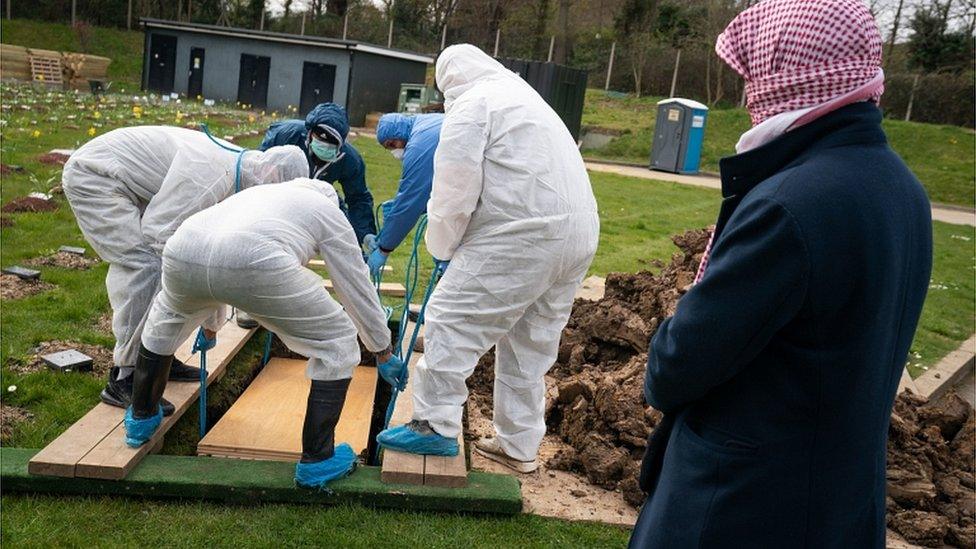Covid: Breathing tube possible factor in boy's death, inquest told
- Published

Four people wearing protective clothing lowered Ismael's coffin into a grave at the Eternal Gardens Muslim Burial Ground in Chislehurst, south-east London
A breathing tube in the wrong position could have contributed to the death of the UK's first known child victim of coronavirus, a doctor told an inquest.
Ismail Mohamed Abdulwahab, from Brixton, died of acute respiratory distress syndrome on 30 March 2020.
The 13-year-old suffered a cardiac arrest three days after testing positive for Covid-19 at King's College Hospital in Camberwell.
His family were not allowed to be with him, Southwark Coroner's Court heard.
Policies in place at the time aimed at preventing the spread of the virus also meant they were self-isolating, due to illness among his siblings, and not able to attend his funeral.
A statement made by Ismail's eldest sister, read out in court, described the teenager as a "kind and genuine soul".
Social distancing was enforced at the teenager's funeral, which his family could not attend
Ismail was suffering with a fever, coughing, shortness of breath, vomiting and diarrhoea before he was admitted to hospital on 26 March.
He was put on a ventilator and then placed in an induced coma, having tested positive for Covid-19 the following day.
Hours before Ismail's death, an endotracheal tube (ET) used to help patients breathe was found to be in the wrong position and a decision was made to leave it and monitor him.
The inquest is examining whether the ET should have been repositioned.
Ismail Mohamed Abdulwahab died at King's College Hospital on 30 March 2020
Dr Tushar Vince, a consultant in paediatric intensive care, treated Ismail on 29 March after he had been intubated, the inquest heard.
Giving evidence via video-link, Dr Vince said the fact that the breathing tube was in the wrong position could have contributed to the teenager's death.
Asked by the coroner if it would be reasonable to put the positioning of the ET on the death certificate as one of the causes, Dr Vince said: "I think it would be reasonable to consider it, yes."
'Potentially life-threatening'
Another paediatric doctor, Anuj Khatri, had pointed out to Dr Vince that the tube was too high but she decided not to reposition it, the court heard.
Dr Vince told the coroner that she had had to consider the consequences of intervening when Ismail was in a prone position - on his front - and concluded that it was the "safer option" to leave him and monitor him rather than flip him on to his back to move the tube.
During his evidence, Dr Khatri told the court he had not agreed with his colleague's decision.
He said he had believed the situation was "urgent" because the position of the tube meant it could become dislodged, which was "potentially life-threatening for a patient who is sedated and paralysed" on muscle relaxants.
Prof Akash Deep, a leading paediatric consultant, said the "dislodged" tube was a "tipping point" in Ismail's death.
Giving evidence, he said he would add "misplacement of the ET" as well as "high BMI" on to the death certificate.
Senior Coroner Andrew Harris gave the "provisional opinion" that he could not apply "neglect" to the death. He adjourned the hearing until Thursday for judgment.
Follow BBC London on Facebook, external, Twitter , externaland Instagram, external. Send your story ideas to hellobbclondon@bbc.co.uk, external
Related topics
- Published31 March 2020
- Published16 April 2020